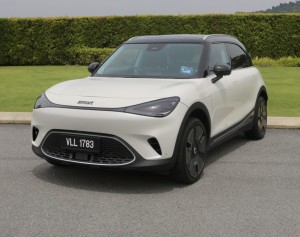KAJANG: The all-electric Neta V has achieved an unenviable record by becoming the first model to have a zero-star rating under the New Car Assessment Program for Southeast Asian Countries (Asean NCAP) 2021–2025 protocol.
In October 2023, the fully imported Neta V was launched in Malaysia at RM100,000 (on-the-road without insurance), making it the cheapest electric vehicle (EV) in the country followed by the BYD Dolphin.
The Neta V is also the first electric vehicle (EV) brand tested at the Miros Provisional CRASE Crash Centre (PC3) in Malaysia.
The tested Neta V is sold in Malaysia, and achieved an overall score of 28.55 points in the assessment with 7.89 points for Adult Occupant Protection (AOP) category, 13.51 points for Child Occupant Protection (COP), 7.14 points for Safety Assist (SA) and 0.00 point for Motorcyclist Safety (MS) category.
The single-variant EV model that is also marketed in Brunei, Indonesia and Thailand offers 2 airbags, Seatbelt Reminder System (SBR) for driver only, Anti-lock Braking System (ABS) and Electronic Stability Control (ESC) as standard.
The model underwent the frontal offset crash test and side impact test under the AOP category.
Unfortunately, the Neta V made a disappointing performance in which it obtained zero point for the frontal offset test with the driver received poor protection on the head, neck, chest and right lower leg.
In the side impact test, the model only achieved 6.31 points over 8.00 points with the dummy received marginal protection to the chest.
Furthermore, the model is not fitted with any Head Protection Technology (HPT) equipment, which has resulted in it not earning any points for the assessment.
In the dynamic assessment for the COP category, the Neta V performed well in both frontal offset and side impact tests.
However, the model received poor points for the Child Restraint System (CRS) installation and vehicle based assessments.
Despite having ISOFIX and top tether fitment, the model is unable to have a friendly fitment installation to more than half of the list of CRS that Asean NCAP recommended.
The new EV hatchback did not offer Autonomous Emergency Braking (AEB) for City and Inter-Urban, Forward Collision Warning (FCW), Lane Keep Assist (LKA) and Lane Departure Warning (LDW).
In addition, all the technologies that Asean NCAP is assessing under the MS category such as Blind Spot Technology (BST), Auto High Beam (AHB) and Pedestrian Protection (PP) are not available in the model.
Based on the tests that Asean NCAP conducted, the frontal offset test showed poor protection to the frontal occupants starting with weak body structure and compromised restraint system which greatly endangering the safety of the car occupants.

The seatbelts equipped for both of the car’s frontal occupants do not have any retractor pre-tensioner and load limiters.
Hence, without these crucial technologies for the seatbelt, it had caused higher risk injuries to the tested dummy to be in contact with the steering wheel or airbag, as proven through this test.
Steering wheel displacement is one of the modifiers that Asean NCAP found post-crash apart from integrity of passenger compartment and A-pillar displacement.
Detailed information regarding the passive safety and active safety performances of the Neta V is accessible from the model’s result report at Asean NCAP
"A basic safety equipment such as retractor pre-tensioner and load limiter for the seatbelts can result in significant outcomes for the safety of the vehicle occupants. With high competition amongst EV manufacturers, it is important for manufacturers to place safety as the main priority when developing a vehicle," said the Asean NCAP statement.
Miros and Asean NCAP also encouraged all car manufacturers, especially from the EV brands, to make safety a priority as they seek to attain the global target of halving road fatalities across the region.












